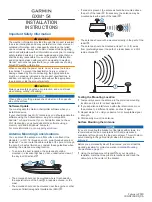
A.H. Systems SAS-542 Biconical Antenna
©
A.H. Systems inc.
–REV C
5
INTENDED PURPOSES
The Biconical antenna is intended for general laboratory use in a wide variety of
industrial and scientific applications and has been designed to be used in the
process of generating, controlling and measuring high levels of electromagnetic
Radio Frequency (RF) energy. It is the responsibility of the user to assure that
the device is operated in a location which will control the radiated energy such
that it will not cause injury and will not violate regulatory levels of
electromagnetic interference.































